The Story of Money: The Myth of Barter
We are all bewitched by words. We confuse them with the real world, and try to live in the real world as if it were the world of words.
-Alan Watts

This third episode in the series has been condensed and retold from Debt: the first 5000 years by David Graeber, which is a phenomenal book and I highly recommend reading it!
We all know the story, it's arguably the most important 'creation myth' in Industrial Society. It tends to go something like this. A long time ago before we had money, people farmed and built everything with their hands. If you made shirts and pants and socks, and your neighbor Sam raised chickens, then you could trade some of your clothes for some of your neighbors chickens, and Sam wouldn't have to walk around naked anymore, and you'd have chicken soup for dinner.
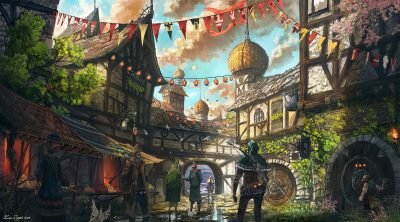
According to Economists everywhere...
Humanity simply suffered under this troublesome system for thousands and thousands of years until some brilliant person invented monetary tokens, and set us all on the path to that beautiful future the luxury of modern industrial technology does all of our work for us. (What? That's not what your world looks like? hmmm)

For quite some time now, Anthropologists have been quietly pointing out that there's something wrong with this picture. There's just no actual evidence for this in any historical or archaeological records, nor in any modern remnants of ancient peoples.
So where did this story come from? Economists generally speak of three functions of money: medium of exchange, unit of account, and store of value. All economic textbooks treat the first as primary. Here’s a fairly typical extract from Economics, by Case, Fair, Gärtner, and Heather (1996):
Money is vital to the working of a market economy. Imagine what life would be like without it. The alternative to a monetary economy is barter, people exchanging goods and services for other goods and services directly instead of exchanging via the medium of money. How does a barter system work? Suppose you want croissants, eggs and orange juice for breakfast. Instead of going to the grocer’s and buying these things with money, you would have to find someone who has these items and is willing to trade them.
You would also have to have something the baker, the orange juice purveyor and the egg vendor want. Having pencils to trade will do you no good if the baker and the orange juice and egg sellers do not want pencils.
A barter system requires a double coincidence of wants for trade to take place. That is, to effect a trade, I need not only have to find someone who has what I want, but that person must also want what I have. Where the range of traded goods is small, as it is in relatively unsophisticated economies, it is not difficult to find someone to trade with, and barter is often used.
Just about every economics textbook today sets the problem in the same way. Please notice however, that this isn't presented as something that actually happened, but purely as conjecture. It's hypothetical.
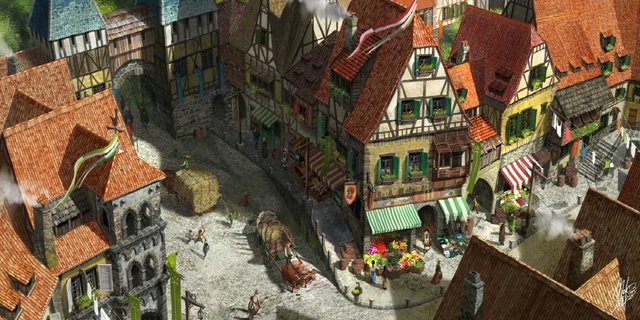
Well, there is actually a simple reason that everyone who writes an economics textbook feels they have to tell us this same story. For economists, it is the most important story ever told. It was by telling it that in 1776, Adam Smith who was teaching Moral Philosophy at the university of Glascow, brought the discipline of economics into being.
Adam Smith didn't make it up entirely himself, for by 330 bce, Aristotle was already speculating along some similar lines. At first, families would have produced everything needed to survive he thought..gradually some would have specialized, some growing grain, others raising animals and end up swapping the two. Money, he assumed, would have emerged from such a process. But like everyone to repeat the story after him, he was never sure exactly how.
Adam Smith was determined, however, to overthrow the idea that money was something only created by Governments. And it was only through this argument that he would insist that economics was a field of study with it's own principles and laws, that is to say, it is distinct from Politics, Ethics, and Government.
This story is so deeply established in our "common sense", that most people anywhere on the planet can't imagine any other way that money possibly could have come about.
The problem though, is that there is no evidence that it ever happened, and quite a bit of evidence to suggest that it did not.
For centuries now, explorers have been trying to find this fabled land of barter— none with success. Adam Smith set his story in aboriginal North America (others preferred Africa or the Pacific). In Smith’s time, at least it could be said that reliable information on Native American economic systems was unavailable in Scottish libraries.
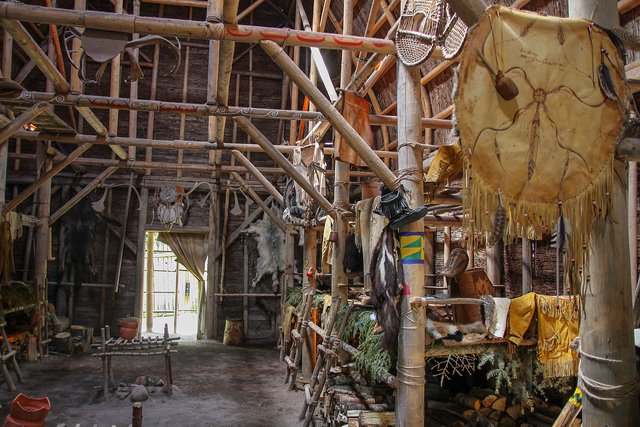
But by mid-century, Lewis Henry Morgan’s descriptions of the Six Nations of the Iroquois, among others, were widely published— and they made clear that the main economic institution among the Iroquois nations were longhouses where most goods were stockpiled and then allocated by women’s councils, and no one ever traded arrowheads for slabs of meat.
Economists simply ignored this and other living examples that didn't fit
Stanley Jevons, for example, who in 1871 wrote what has come to be considered the classic book on the origins of money, took his examples straight from Smith several hundred years before, with Indians swapping venison for elk and beaver hides...
and made no use of actual descriptions of Indian life that were easily available to him
Around that same time, missionaries, adventurers, and colonial administrators were fanning out across the world, many bringing copies of Smith’s book with them, expecting to find the land of barter. None ever did. They discovered an almost endless variety of economic systems. But to this day, no one has been able to locate a part of the world where the ordinary mode of economic transaction between neighbors takes the form of “I’ll give you twenty chickens for that cow.”

The definitive anthropological work on barter, by Caroline Humphrey, of Cambridge, could not be more definitive in its conclusions: “No example of a barter economy, pure and simple, has ever been described, let alone the emergence from it of money; all available ethnography suggests that there never has been such a thing.” Now, all this hardly means that barter does not exist— or even that it’s never practiced by the sort of people that Smith would refer to as “savages.” It just means that it’s almost never employed, as Smith imagined, between fellow villagers. Ordinarily, it takes place between strangers, even enemies.
Let us begin with the Nambikwara of Brazil.
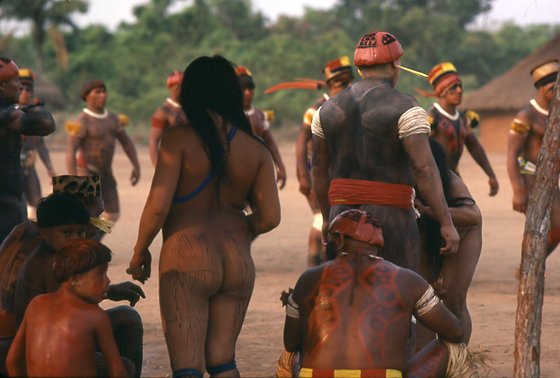
They would seem to fit all the criteria: they are a simple society without much in the way of division of labor, organized into small bands that traditionally numbered at best a hundred people each. Occasionally if one band spots the cooking fires of another in their vicinity, they will send emissaries to negotiate a meeting for purposes of trade. If the offer is accepted, they will first hide their women and children in the forest, then invite the men of other band to visit camp. Each band has a chief; once everyone has been assembled, each chief gives a formal speech praising the other party and belittling his own; everyone puts aside their weapons to sing and dance together— though the dance is one that mimics military confrontation. Then, individuals from each side approach each other to trade:
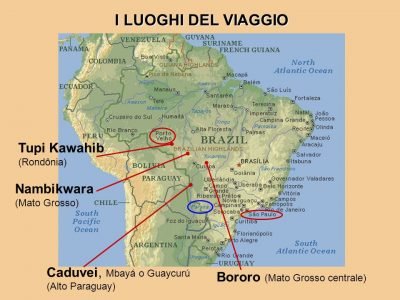
If an individual wants an object he extols it by saying how fine it is. If a man values an object and wants much in exchange for it, instead of saying that it is very valuable he says that it is no good, thus showing his desire to keep it. “This axe is no good, it is very old, it is very dull,” he will say, referring to his axe which the other wants. This argument is carried on in an angry tone of voice until a settlement is reached. When agreement has been reached each snatches the object out of the other’s hand. If a man has bartered a necklace, instead of taking it off and handing it over, the other person must take it off with a show of force.
Disputes, often leading to fights, occur when one party is a little premature and snatches the object before the other has finished arguing. The whole business concludes with a great feast at which the women reappear, but this too can lead to problems, since amidst the music and good cheer, there is ample opportunity for seductions. This sometimes led to jealous quarrels. Occasionally, people would get killed. Barter, then, for all the festive elements, was carried out between people who might otherwise be enemies and hovered about an inch away from outright warfare— and, if the ethnographer is to be believed— if one side later decided they had been taken advantage of, it could very easily lead to actual wars.
To shift our spotlight halfway around the world to Western Arnhem Land in Australia, where the Gunwinggu people are famous for entertaining neighbors in rituals of ceremonial barter called the dzamalag. Here the threat of actual violence seems much more distant.
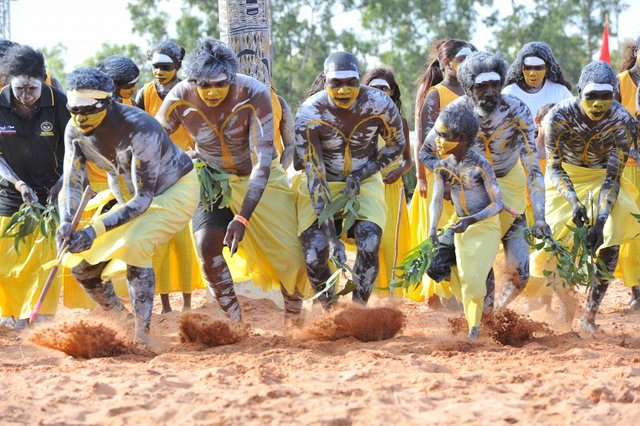
Partly, this is because things are made easier by the existence of a moiety system that embraces the whole region: no one is allowed to marry, or even have sex with, people of their own moiety, no matter where they come from, but anyone from the other is technically a potential match. Therefore, for a man, even in distant communities, half the women are strictly forbidden, half of them fair game. The region is also united by local specialization: each people has its own trade product to be bartered with the others.
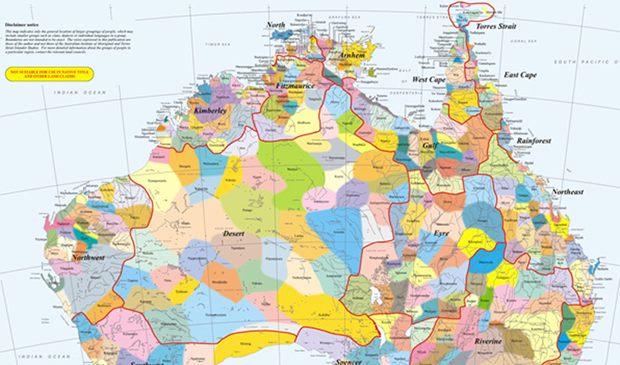
a map of aboriginal cultures in Australia
What follows is from a description of a dzamalag held in the 1940s, as observed by an anthropologist named Ronald Berndt. Once again, it begins as strangers, after some initial negotiations, are invited into the hosts’ main camp. The visitors in this particular example were famous for their “much-prized serrated spears”— their hosts had access to good European cloth. The trading begins when the visiting party, which consisted of both men and women, enters the camp’s dancing ground of “ring place,” and three of them began to entertain their hosts with music. Two men start singing, a third accompanies them on the didjeridu. Before long, women from the hosts’ side come and attack the musicians: Men and women rise and begin to dance.
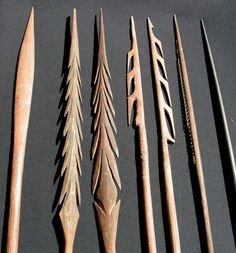
The dzamalag opens when two Gunwinggu women of the opposite moiety to the singing men “give dzamalag” to the latter. They present each man with a piece of cloth, and hit or touch him, pulling him down on the ground, calling him a dzamalag husband, and joking with him in an erotic vein. Then another woman of the opposite moiety to the pipe player gives him cloth, hits and jokes with him. This sets in motion the dzamalag exchange. Men from the visiting group sit quietly while women of the opposite moiety come over and give them cloth, hit them, and invite them to copulate; they take any liberty they choose with the men, amid amusement and applause, while the singing and dancing continue. Women try to undo the men’s loin coverings or touch their penises, and to drag them from the “ring place” for coitus. The men go with their dzamalag partners, with a show of reluctance, to copulate in the bushes away from the fires which light up the dancers.
They may give the women tobacco or beads. When the women return, they give part of this tobacco to their own husbands, who have encouraged them to go dzamalag. The husbands, in turn, use the tobacco to pay their own female dzamalag partners … New singers and musicians appear, are again assaulted and dragged off to the bushes; men encourage their wives “not to be shy,” so as to maintain the Gunwinggu reputation for hospitality; eventually those men also take the initiative with the visitors’ wives, offering cloth, hitting them, and leading them off into the bushes. Beads and tobacco circulate.
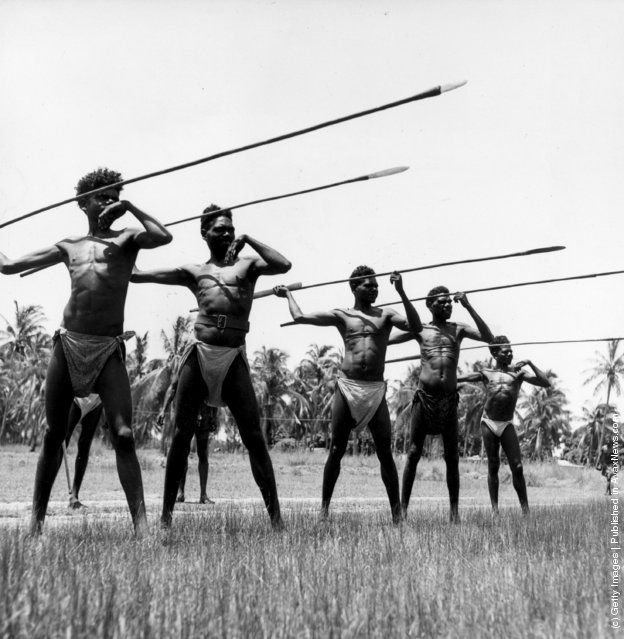
Finally, once participants have all paired off at least once, and the guests are satisfied with the cloth they have acquired, the women stop dancing and stand in two rows and the visitors line up to repay them. Then visiting men of one moiety dance towards the women of the opposite moiety, in order to “give them dzamalag.” They hold shovel-nosed spears poised, pretending to spear the women, but instead hit them with the flat of the blade. “We will not spear you, for we have already speared you with our penises.” They present the spears to the women. Then visiting men of the other moiety go through the same actions with the women of their opposite moiety, giving them spears with serrated points. This terminates the ceremony, which is followed by a large distribution of food.
This is a particularly dramatic case, but dramatic cases are revealing. What the Gunwinggu hosts appear to have been able to do here, owing to the relatively amicable relations between neighboring peoples in Western Arnhem Land, is to take all the elements in Nambikwara barter (the music and dancing, the potential hostility, the sexual intrigue), and turn it all into a kind of festive game— one not, perhaps, without its dangers, but (as the ethnographer emphasizes) considered enormous fun by everyone concerned. What all such cases of trade through barter have in common is that they are meetings with strangers who will, likely as not, never meet again, and with whom one certainly will not enter into any ongoing relations.
This is why a direct one-on-one exchange is appropriate: each side makes their trade and walks away. It’s all made possible by laying down an initial mantle of sociability, in the form of shared pleasures, music and dance— the usual base of conviviality on which trade must always be built. Then comes the actual trading, where both sides make a great display of the latent hostility that necessarily exists in any exchange of material goods between strangers— where neither party has no particular reason not to take advantage of the other— by playful mock aggression, though in the Nambikwara case, where the mantle of sociability is extremely thin, mock aggression is in constant danger of slipping over into the real thing. The Gunwinggu, with their more relaxed attitude toward sexuality, have quite ingeniously managed to make the shared pleasures and aggression into exactly the same thing.

Recall here the language of the economics textbooks: “Imagine a society without money.” “Imagine a barter economy.”
One thing these examples make clear is just how limited the imaginative powers of most economists turns out to be.
Why? The simplest answer would be: for there to even be a discipline called “economics,” a discipline that concerns itself first and foremost with how individuals seek the most advantageous arrangement for the exchange of shoes for potatoes, or cloth for spears, it must assume that the exchange of such goods need have nothing to do with war, passion, adventure, mystery, sex, or death.
Economics assumes a division between different spheres of human behavior that, among people like the Gunwinggu and the Nambikwara, simply does not exist.

The Story of Money
The Story of Money 1: Intro
The Story of Money 2: Work, Wage Labor
The Story of Money 3: The Myth of Barter
Next time, join us as we explore the deep history between Markets and Standing Armies!
Quick addendum: A few additional things to chew on.
In every known pre-industrial culture in the world, gift economies are hugely present. They take many shapes and forms. But in nearly all cases, you are surrounded by people that you've known your entire life, and are likely to know for the rest of your life, assuming they don't die before you do.
In these situations, if someone needs something...you give it to them. This is your insurance policy, if you have more then you need anyway, by giving it to whoever needs it, you're tying yourself into a social net that supports whomever needs supporting. This really appears to be the natural state of human communities. They care of each other.
It's like walking next door to ask your neighbor for a few eggs or a cup of sugar (WHICH I LOVE DOING BY THE WAY!!!!). If you offer to pay them for it, the whole thing feels gross really quickly. However, you accept their generosity, you remember and appreciate it, and you bring them something nice at a later date. This is the stuff culture is made of. You can't become close to people where you have no debt. If you settle all your debts, you are strangers, you have nothing for each other.
It's the WAY you are indebted to them, and they to you that makes life. Don't settle your debts, be indebted beautifully, and you will always have a place in the world.
We'll approach this more in depth in a future post.
You've put a tremendous amount of effort into this post and it deserves to endure as a pinnacle of scholarship!
Funny, your description of different barter practices made me think of the book The Gift by Lewis Hyde, which despite the way it is advertised on the cover is really more of an economics treatise. And then you mentioned gifting economies in the first comment.
Which is kind of what we've got going on here with Steemit, isn't it? Our voting power builds up throughout the day and then we build value and community by exchanging it freely with those we admire.
Excellent effert ... nicely put.
mmmhmm! I'll check that out, Thanks Winston!
Hahaha! It's true!! It has a lot of parallels to gift economy. You want to know a secret?
When I think of Steemit as gift economy, I feel super happy about it, but sometimes my brain gets knocked into the rut of thinking about it as "What am I getting from it?" And thats usually when I feel kinda crappy about it all, and critical...I try to keep things in the first place, but you know...every day is different.
There's a balance.
I came here thinking, "I'm just going to write the best I can and enjoy reading a bunch of interesting people."
Within a day I was like, "Only 10 votes on my post? What am I doing wrong?"
I think as long as we can keep our focus on giving, and treat the (wildly inconsistent) payouts as an occasional gift, we'll do okay.
Yeah!!! That is totally the deal isn't it. It's all about the frame of reference.
Yeah, give until you have nothing left and then expect the next man to give to you, that's sustainable.
hmmm. perhaps this one suites you then?
I take from no one, I exchange freely. Perhaps not always on equal terms, but fundamentally my actions are done with mutual consent.
Aye, I respect that mentality. Also, it would seem that there are some components of our global cult of industry that take everything they can get from the land, and the people who live there, often without consent, or anything resembling compensation. I mean, in the US, our entire country was taken largely from people who were well-meaning enough to attempt to share it, but systemically they were pried off of the most valuable places, and murdered, starved, and really rent into the ground.
And, it's not unusual, every place in the world that has people living there, was once occupied by different people before them. It's still happening today.
I don't speak for condemnation, but rather acknowledgement, there are hundreds of tribes of indigenous people in the amazon that have been persecuted, silenced, murdered, and god knows what by Chinese oil companies. They've destroyed vast distances of water sheds with faulty pipelines and spills...caused unmeasurable damage and suffering to people, animals, and the other beings there.
Those methods of acquiring cheap oil funds Chinese industry, which is unimaginably intertwined with every industrial nation on the planet. Was the final transaction we make at the grocery store done free and clear in the spirit of mutual consent? Probably.
But what about the extensive chain of financial/economic hegemony that must always extract value, must always keep growing, in order to support such commercial endpoints as a store, a business?
We are inextricably tied to such things.
The idea of well meaning indigeonus americans who tried to share there land is unfortunatly misplaced. The truth is that European colonizers were resisted almost everywhere they went and were only tolerated in so far as it either benefited a particular tribe or they had no choice. It is more accurate to think of the settling of north america as a long series of wars, but one that was doomed from the start for the natives as they were no match numerically or technologically for the Europeans.
Guess it depends who you listen to :P The bigger reality as I'm aware of it is that 90%+ of all of the natives were wiped out within 50 years of contact by European diseases.
Yes, definatly
And that mutual consent is all that matters. In an exchange each party values the other good MORE than their own, otherwise there would be no exchange.
I think this idea of barter is rooted in individualism, and probably made by follower of individualism in post ww2 world.
Can take example of anarchist spain, when people threw gov & banks away, living in community, but it was not based on this principle of individual work worth and market.
In primitive society, community was very important, and the repartirion was really obvious and all production was focused on survival need, food cloth, and tools for hunting , everyone knew they needed each others and everyone needed roughly the same basics things, and communities were fairly small, so thete was not much point in indivual accounting like in modern world.
Everyone needed some foods, cloth and home, and things were built to accomodate everyones need in the community, knowing they all need the work of each other to survive.
In native community, there is lot of care put in development of each member of the community, everyone is a precious gift which skills are needed for the survival and thriving of the community, and the community is the more important.
In this sort of organisation, bartering at individual level doesnt make much sense.
Barter could happen at inter community/tribe level, but it was not like people had bank account so it wzs still organized at community level, see what is over produced and what can it be exchanged for, but i dont think it really happened at individual level.
But now there is much greater diversity of object, which are not surivival needs, and made of hundreds parts, made by diffetent entities, including innovation and soeculative investment at world wide scale, so it need world wide balancing of individual work worth.
But in previous time where all was survival oriented, what everyone need was easy to determine and there was no questioning about it, everyone could easily see what his skill are needed for, and what he needed from others, and what the community needs as a whole, without going through indivual worth on global impersonal market.
hi h0bby!!! mmhmmmm, yeah! what a good perspective and explanation...
It's so true, things aren't so simple these days =) I
That makes some sense to me too, I think it's interesting how many tribal people's see their community as a 'body'...if some part of it is sick, all of it is sick. Very differing mentality then today! But it's a different world. We can't go back...but our global empire of getting more for less seems to be approaching some limits of how far it can stretch.
In some ways this seems the exact opposite of much of are current social system, where we want people to be as replaceable as possible.
Thanks for dropping it and commenting, I'm looking forward to getting to know you a bit!
Well i think society of today is vastly dominated by satanist mindset, which tend to revolve around pyramidal organisation, and people are not connected to each other anymore, and see other purely as ressources and object, without valueing too much human potential, and all the person is summarized by how much ressource can be gained from him, as pure materialism / satanism anti humantirian.
This whole system of individualism stem from that, as with centralization, all the focus goes to order givers who are just caring about ressources production, and from there come all the economic model based on individual work instead of focusing on the bigger picture in more decentralized manner, seeing what everyone else need and how to improve life level of the community as a whole.
Now most people barely haveba consciousness of their own, and have weak will power, and see order following as only mean of existence, which prevent true sense of community, and true sense of self in relation to others.
For those at the top of the pyramid things never been so well i bet, all the wealth and power has never been concentrated in so few hands, and the rest of people so weak and confused about everything that can hardly concieve much anything else than following orders and being duped into false identities propagated in large scale, instead of building inner strength and sense of self determination to guide their action and production.
interesting!!! I've never heard of references to pyramidal organisation as related to satanist mindset before..but I can see why one might say that. Our organisation structures are looking a bit depressive =(
well, here's to building inner strength and self determination for the good of all beings!!!
Very cool post! I'm glad to see it did good. I'm now following you and look forward to the next installment. Thank you for the support by the way.
Thanks brother! I am having trouble looking at your profile for some reason right now...everything seems to be working on steemit.
https://steemit.com/@teamsteem
Kind of strange, getting a page doesn't exist! 404 response...must just be a bug.
I have seen this error happening quite a long time ago. It happens sometimes. Steemit is still very young. It's getting better.
Man...the level of effort was impressive. Not only did you put noticeable time and energy in it, but you covered at great topic. I hate money. We have grown to really not like it. Trading your time at a widget job to make digits on a computer, just to transfer those digits to somewhere else. Just over three years ago we moved to souther Missouri into the Ozarks. It's amazing here. We have learned to barter here. A fair exchange for time effort and energy for someone else's. We have found that the 'double coincidence' is sometimes not available. So we have branched into having multiple things available for trade, or we do a three way trade. We once had a trade of 2 rabbits traded for a pot belly pig traded for 40 dollars. It was a good day! Adventure on!
I'm new here and this is the second post I've read and I'm pretty thrilled. Great post and quality content.
I didn't know there was a fuss amongst economists as to ''the land of barter''. I feel pretty glad things didn't turn out to be as predicted, makes you really wonder who is the savage after all huh :)
Economists need to understand that not everything is a result of shrewd calculation. I bet there are some interesting discussions at the comments section :)
I'm eagerly awaiting for your next post man, sounds like a very interesting topic which coincides with my concerns also regarding the MICs. Keep up the good work man, God bless you!
Thanks Theodore!! Much appreciated, new one will be one soon :P
Great write. I'm not into Econs 101 and pretty much got into cryptos without knowing anything about economics. I'd assume that barter begins from agricultural perishables, but what does this say about mainstream understanding of econs if bartering wasn't a thing? Trying to get the conclusion lol
Yeah, that is the 900 lb question Kevin. David Graeber goes much more in depth in Debt: the first 5000 years , and is an absolutely fascinating book. I think it says that there may be some very basic ideas about our reality that are worth extricating from our minds and taking a closer look at.
Which makes sense from our perspective. From Tribal Peoples' Perspectives (the ones we know about anyway), it appears that their actual behavior is very different. The tzutujil maya in the Guatemalan Highlands for instance, hunters are not allowed to eat their own meat, and many of them are practically vegetarian. Any animals they manage to bring back get distributed to young women and their grandmothers of other families who cook them, process or dry them, and distribute the food back through the village (Lake Atitlan, their "village" was about 40,000 people in the 80s before rampant genocide and cultural violence ensued from radical industrialized local christians with modern weaponry).
The families of the hunters had to eat meat that was caught by a different hunter, and processed by someone else. They're not allowed to eat their own proceeds. No formal exchange happens, it's just part of peoples ritual in this context. Consequently members of farming families are largely responsible for feeding the hunting families.
It seems that the way people live together all around the world has been incredibly diverse, we can only begin to understand the magnitude of differences in how every group of humans sees their world and works within it. It doesn't make it any simpler to imagine what that means for us...but I find it somewhat inspiring that the possibilities may be wider then we thought.
A solid reflection !! - ))
IN that .. a 'massive' MajoritY .. will migrate to the 'new' way(s) of "financial communication" ((ie) .. without middle "meN" -)) ... without the 'need' for recognizing that .. WE haven't always placed arbitrary "VALUE's" on "objects" .. (ie) my 20 chickens for your cow - ))
B(art)E'ring .. the ""BE (art) ring"" .. one spHERE ! - )
From my perspective, " .. to get the conclusion " .. ??
" .. if bartering wasn't a thing " .. just MEaSURE, your personal FLOW - ))
= MAIN-STREAM ??? .. or .. a personal "R_i've_R" ??? - )))
TO T(ak)E .. or .. TO G(i'V)E a "DAM" ???
.. a B'LOCK .. or .. an unbreakable .. C'HAIN ???
The sweet balance of INfINiTY - ))
Elusive !! .. and, ever PRE_SENT !! - ))
lovelovelove )))
greb'Z )
Love that you're doing this series dude. Nice to see you back, can't wait to dig into all 3 pieces.
Thanks Chrissy! Hopefully the next one will really blow some nogins :P You been takin a break from Steemit too? Excited to be back?
Yeah! The break was MUCH needed though.
Lovely post! We all are free to interpret the existence of money the we like, the way we view it and the way it relates to us.
In my own view, money is the force that drives want, man is naturally covetous and the only force that can drive him through such a long road of insatiable quest is money which was the reason behind the introduction of money, take money away and then you realize that life is simple in nature.
It's true that our world has taken a great desirable shape because of money yet we also are being exposed to so many ill 😷 situations that wouldn't have been in place without the force call money, the basic needs of man can be well understood in a world without money.
Thanks you @itchykitten.
Charles Eisenstein proposes that money is sort of the like growth hormone of human civilization to help us through adolescence ...and it's going to have to taper off as we mature into beings that respect their own mother =)
Here's a pretty cool video short about some of his ideas
Lovely!
I really like the anthropology in this piece yet I feel some mention needs made of early stone age communities and crannog dwellings, Knights Templar and the legal concept of 'caveat emptor' (buyer beware). There is so much to be said for the organisation of a monetary system from the drop of the Gold Standard to bitcoin! I hope I have not jumped the gun with these initial comments and look forward to some more reading. Many Thanks.
Not at all! Please, anything you find interesting, share =) I will be going through this with a healthy dose of my own strange perspective...and will be leaving all kinds of things out.